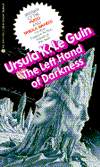
Hardwired Humanity, by Sarah Wagner
Book Review by Nick DeMarino
Wagner's strong suit is characterization through dialogue. Mostly told in the over-the-shoulder third person, protagonists' immerse the reader in their worlds through their reactions to it. Cursory descriptions introduce settings, but they're usually a springboard to personal experiences. This technique is effective—indeed, who can forget the driven, single-mindedness of Spider in "Switch," the haunted and self-sacrificing actions of Shade in "Evolution of a Shadow," or the independent, rough-and-tumble attitude of Avery in "The Wreck of the Griffin"? However, this approach is not without flaws: many times the narration leaves out relevant details that the protagonists take for granted. Take for instance the meeting between Spider and his former nemesis in "Switch." The reader gets a brief glimpse of the meeting place (The Egyptian wing of a museum), but the currency of setting is quickly cashed into a brief memory and parlays into dialog that could just have easily occurred in a park or library.
Each story is familiar but distinct in its particulars. The plots of "Switch" and "Evolution of a Shadow" involve bands of underground techies-for-hire and involve numerous conspiracies and plot twists. "The Wreck of the Griffin" is an action-adventure story, while "When Closed Eyes Open" is a political satire about the military. The short pieces "Venus and the Birth of Zephyrus" and "Canned Man" are lyrical and almost read as poetry. While these classic touchstones receive fresh purfling, they're still visibly derivative. That's okay though, because the focus isn't the devices, but the individual characters' experience of them.
Central to each story is the relationship between people and technology, as well as the drama that surrounds it. These are tales of characters interacting with radically alien beings and they way in which they affect their lives. Love and distant longing are shared by each protagonist and exercise heavy influence over the trajectory of each tale. There's also plenty of betrayal and selfishness, always on the hands of the antagonists. Wagner's generally happy endings display a moralistic optimism that's a bit contrived, but certainly a crowd pleaser. Juxtapose against this are here shorter pieces, which are quite hopeless and dreary. They're stark, but they're more moving.
There are some technical glitches in Hardwired Humanity, namely an inconsistent and distracting type-font as well as a few typos, but these are minor. The stories alone merit a four out of five rating, but their bundling compounds their flaws as well as their virtues. I suggest reading a story at a time between other readings.
|
Click here to buy Hardwired Humanity, by Sarah Wagner on Amazon
|
Hardwired Humanity, by Sarah Wagner on Amazon

| More Books You Might Like |
| Comments on Hardwired Humanity, by Sarah Wagner |
| There are no comments on this book. |




